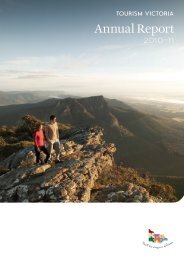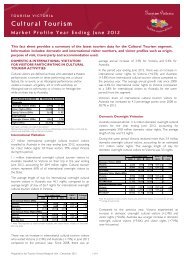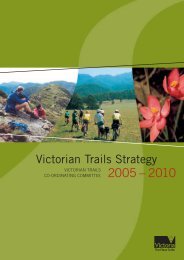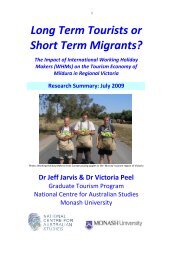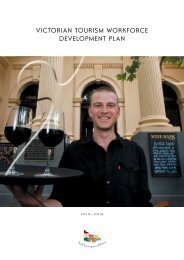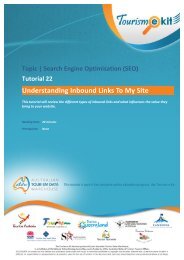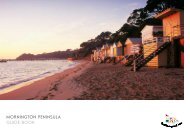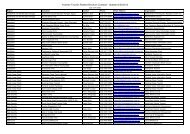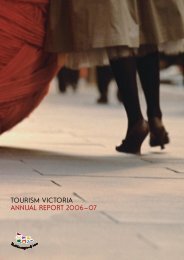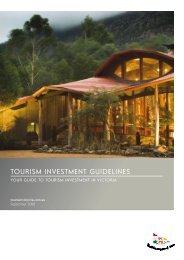Crisis Communications Handbook for Regional ... - Tourism Victoria
Crisis Communications Handbook for Regional ... - Tourism Victoria
Crisis Communications Handbook for Regional ... - Tourism Victoria
Create successful ePaper yourself
Turn your PDF publications into a flip-book with our unique Google optimized e-Paper software.
Response<br />
Upon news of a potential serious illness, the TRRG immediately meets and quickly moves to reassure and in<strong>for</strong>m<br />
visitors and potential visitors by updating the in<strong>for</strong>mation available via websites, telephone hotlines, local visitor<br />
radio and Visitor In<strong>for</strong>mation Centres.<br />
A media release is issued that re-emphasises the precautions that people visiting affected areas should take<br />
and also details the actions taken from the beginning of the bloom to warn people of the dangers, including<br />
In<strong>for</strong>mation Sheets, the hotline and signs.<br />
Following briefings from the Incident Controller, regular Visitor In<strong>for</strong>mation Updates to be made available to<br />
visitors are distributed by fax to all tourism operators, accommodation providers and Visitor In<strong>for</strong>mation Centres.<br />
Once it has been confirmed that the girl’s illness is not related to blue green algae, the TRRG steps up its<br />
activities to underline the fact there has never been a serious illness associated with outbreaks. It also seizes<br />
the opportunity to again highlight the unaffected areas and recreational pursuits in the region.<br />
Other TRRG actions include:<br />
• As required, internal updates are faxed out to tourism operators and accommodation providers on the<br />
latest situation, including details of ef<strong>for</strong>ts being made to manage the media<br />
• All media releases are <strong>for</strong>warded to tourism operators, accommodation providers and the region’s nine<br />
local tourism associations<br />
• The DSE incident controller is encouraged to engage with the media to put the issue into its proper<br />
context and reassure observers where appropriate<br />
• The public is advised that tourism operators and accommodation providers in the region are well versed<br />
with what symptoms of illness to watch out <strong>for</strong> and how to respond if necessary<br />
• Further face-to-face meetings are arranged with affected tourism operators and accommodation providers<br />
to gauge feedback and canvas ideas<br />
• Briefings are held <strong>for</strong> key stakeholders on the expected further impacts of the claim<br />
• Continuing positive media opportunities are pursued to underline the level of expertise dealing with the<br />
situation as well as the other activities on offer in the region such as bushwalking, wineries and touring<br />
• A program of special tourism deals is <strong>for</strong>mulated, packaged and promoted to the travel industry<br />
• Further journalist familiarisation visits are arranged in conjunction with launch of the special deals package<br />
• Modest advertising is placed in metropolitan newspapers, promoting the region’s unaffected areas and<br />
activities, and any special deals on offer<br />
• High profile sporting, television figures and politicians are encouraged to promote the region’s desirability<br />
and highlight its ef<strong>for</strong>ts to fight back from adversity.<br />
CRISIS COMMUNICATIONS HANDBOOK FOR REGIONAL AND LOCAL TOURISM 60




